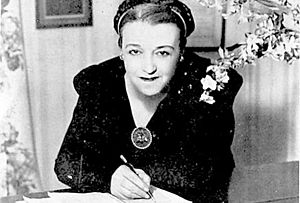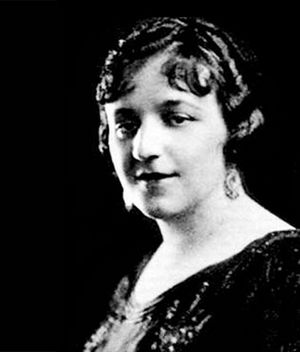María Grever facts for kids
Quick facts for kids
María Grever
|
|
|---|---|
 |
|
| Background information | |
| Birth name | María Joaquina de la Portilla Torres |
| Born | September 14, 1885 León, Guanajuato, Mexico |
| Died | December 15, 1951 (aged 66) New York City, New York |
| Occupation(s) | Composer |
| Labels | Hudson |
María Grever was a famous Mexican composer. She was the first woman from Mexico to become known around the world for her music. She wrote many songs, but one of her most famous is "What A Difference A Day Makes" (originally "Cuando Vuelva a tu Lado"). Many artists, like Dinah Washington, have sung this song.
Contents
Early Life and Music Studies
María Joaquina de la Portilla Torres was born in León, Guanajuato, Mexico. Her father was Spanish, and her mother was Mexican. For her first six years, she lived in Mexico City.
In 1891, when María was six, her family moved to Sevilla, Spain. She studied music in France with famous teachers like Claude Debussy. In 1900, she moved back to Mexico. There, she continued her music studies at her aunt's school.
In 1907, María, who was 22, married Leo A. Grever. He was an American oil company executive. In 1916, she became a citizen of the United States. She then moved to New York City, where she lived for the rest of her life.
María Grever's Music Career
María Grever wrote more than 1000 songs. Most of them were boleros, a type of slow-tempo Latin music. Her music became popular in Latin America, Europe, and the United States.
People said she had perfect pitch. This means she could identify any musical note just by hearing it. She wrote most of her songs in one key. She wrote her first piece of music, a Christmas carol, when she was only four years old. Her first song, "A Una Ola" (To a Wave), was written when she was 18. It sold three million copies!
In 1920, María Grever started working as a film composer. This means she wrote music for movies. She worked for big studios like Paramount Pictures and 20th Century Fox. In 1935, she joined ASCAP. She worked with other songwriters like Stanley Adams and Irving Caesar.
Famous Songs and Hits
Grever's first song to become famous around the world was "Júrame" (Promise Me). It was a habanera-bolero song sung by the tenor José Mojica.
Many other hit songs followed, including:
- "Volveré" (I Will Return)
- "Te Quiero Dijiste" (I Love You, You Said) - This song was written for the 1944 Esther Williams movie Bathing Beauty.
- "Cuando Vuelva a Tu Lado" (When I Return To Your Side)
- "Por Si No Te Vuelvo a Ver" (In Case I Don't See You Again)
- "Tipitipitin" (also known as "Ti-pi-tin," recorded by the Andrews Sisters)
She also wrote many other songs like "Para Que Recordar," "Ya No Me Quieres," "Tu, Tu y Tu," and "Alma Mia."
Later Life and Legacy
María Grever passed away in 1951 in New York after being sick for a long time. She wanted her body to be moved to Mexico City, and her wish was granted.
Tributes and Success After Her Death
Many artists have sung María Grever's songs after she died:
- In 1953, the Argentine singer and actress Libertad Lamarque played María Grever in a movie called Cuando me vaya (When I Leave). Later, Lamarque released a popular album of Grever's songs.
- In 1959, Dinah Washington recorded "Cuando Vuelva a tu Lado" with English words. She called it "What A Difference a Day Makes." This recording won a Grammy Award in 1959. In 1998, it was added to the Grammy Hall of Fame.
- In 1964, the opera singer Alfredo Kraus recorded "Júrame."
- In 2018, opera soprano Ailyn Perez sang "Júrame" live in Chicago.
- On February 11, 2021, Google honored her with a special Google Doodle on their homepage.
Famous Words from María Grever
Here are some things María Grever said:
- "I had to leave my country, and now in New York, I am interested in Jazz and Modern Rhythms, but above all, in Mexican Music, which I long to present to the American people. I am afraid they don't know much about it."
- "Hold me in your arms, and count the beats of our heart."
- "Sometimes I wonder what would happen if I found a soul like mine."
- "I had such a strong faith in the song, but the publishers thought I was crazy. I have been 20 years before an audience, and as a sensitive artist, I feel the vibrations of the public. I knew this song would be a success. So I published it myself." (She said this about her song "Ti-pi-tin.")
- "What a difference a day makes."
Interesting Facts About María Grever
- María Grever studied piano, violin, and voice (singing).
- In the late 1930s, she worried she might go blind because of an eye disease.
- Old newspaper articles from The Brooklyn Daily Eagle called her "the busiest woman in all New York."
- María Grever started her own music publishing company, Portilla Music Publishing. She did this because other publishers didn't want to publish her song "Ti-pi-tin." That song later became one of her most famous!
- In 1948, María had a stroke. This made her left side paralyzed.
- Her son, Charles Grever, created Grever Music Publishing. This company later became Grever International and had a huge collection of Mexican music.
- Her great-grandson, Stuart Livingston, also works in the music industry.
Images for kids
See also
 In Spanish: María Grever para niños
In Spanish: María Grever para niños
 | Mary Eliza Mahoney |
 | Susie King Taylor |
 | Ida Gray |
 | Eliza Ann Grier |



